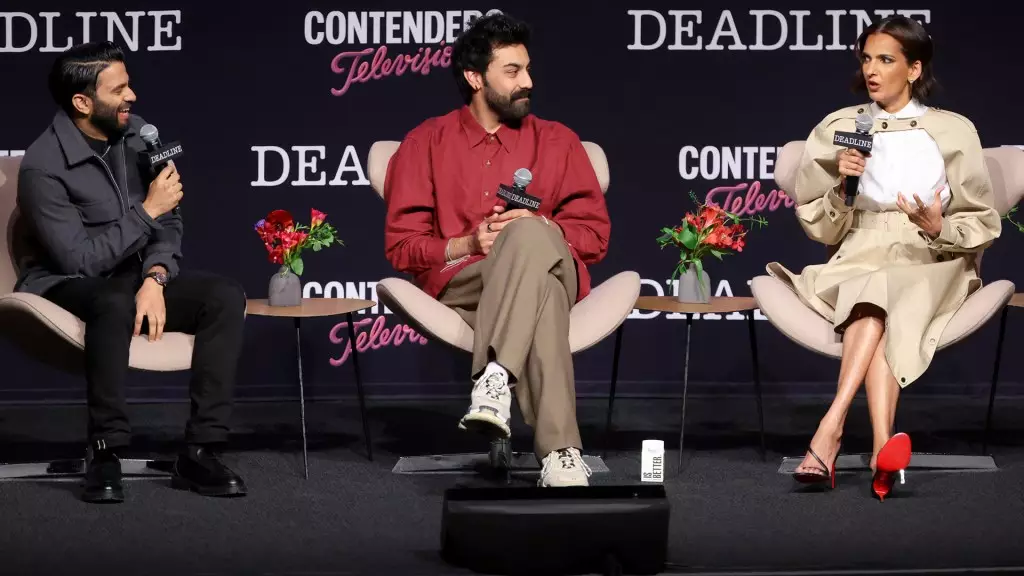In an era where narratives are finally evolving to embrace diversity and complexity, the character of Lucky Auntie, played by Poorna Jagannathan in Hulu’s comedy series “Deli Boys,” stands as a game-changer. This character defies the conventions of traditional storytelling, shifting from a male archetype typically dominating the crime drama landscape. When series creator Abdullah Saeed was inspired by Geena Davis’ advocacy for gender equality in media, he returned to the drawing board and made the bold choice to infuse female strength into a role originally intended for a man.
Lucky Auntie’s transition from “Lucky Uncle” signifies more than just a name change; it marks a cultural shift towards more nuanced portrayals of women in positions of power. Jagannathan’s role draws parallels to the visceral complexity of Tony Soprano while simultaneously incorporating the vibrant, indulgent chaos typically seen in “The Real Housewives of Orange County.” This innovative blend creates a refreshing, layered character that resonates with audiences in both comedic and dramatic dimensions.
The Duality of Strength and Vulnerability
One of the more compelling aspects of Lucky Auntie is her ability to embody both ferocity and tenderness. As Jagannathan adeptly demonstrates, Lucky is not just a crime lord; she’s also the nurturing force in her nephews’ lives. This duality adds further depth to a character that, while steeped in violence—shooting with one hand and stabbing with the other—still finds the space to be a maternal figure. As she herself notes, it’s a role unlike anything previously offered to South Asian women in media.
Jagannathan’s portrayal speaks volumes about the complexities of femininity; a woman can be fierce and kind simultaneously. Her co-star Asif Ali highlights this balance, suggesting that Jagannathan brings a softness to an otherwise hardcore character. In doing so, she flips the narrative, showcasing that women can occupy both light and shadow in a way that is multifaceted and relatable. The role challenges the outdated notion that women in crime stories must conform to a single, rigid archetype—either a seductress or a victim—illustrating that women can succeed as formidable figures in their own right.
Questioning Gender Norms with Subtlety
“Deep in the portrayal is a commentary on how South Asian culture often infantilizes male children,” Jagannathan mentions. This theme resonates strongly through Lucky Auntie’s dynamic with her nephews, Mir and Raj. By demonstrating a simultaneous reliance and independence from her familial ties, Lucky maintains her authority while nurturing her family. It’s a subtle message that challenges patriarchal structures without directly confronting them, a nuanced act of rebellion that is rife with potential for future storytelling.
In addition to addressing familial roles, Lucky Auntie’s physical actions—cleaning up her nephews, all while managing life-or-death situations—invite a conversation about women’s labor in both domestic and public spheres. It shows that women can juggle multiple responsibilities, challenging the idea that they are capable only of singular tasks. This construction of femininity, steeped in both care and violence, offers a richer landscape for examining gender relations in media.
The Importance of Diverse Representation
The emergence of roles like Lucky Auntie is vital not just for representation, but for the broader implications it has for societal norms. By offering characters that contrast typical gender portrayals, “Deli Boys” invites audiences to rewrite the narrative around women in power. It’s not merely about equality; it’s about embracing the full spectrum of human experience, including the intricacies of female strength.
As Poorna Jagannathan continues to shine a spotlight on complex female characters, she sends a clear message: the media must continue to evolve. Characters like Lucky Auntie underscore the importance of seeing women in roles that suggest power, chaos, and maternal care all within a single narrative. This series advocates for the evolution of storytelling, urging creators to see beyond traditional frameworks and embrace the creative horizons they can unlock by allowing women to lead from the front, portraying strength that is rich and multifaceted.


Leave a Reply